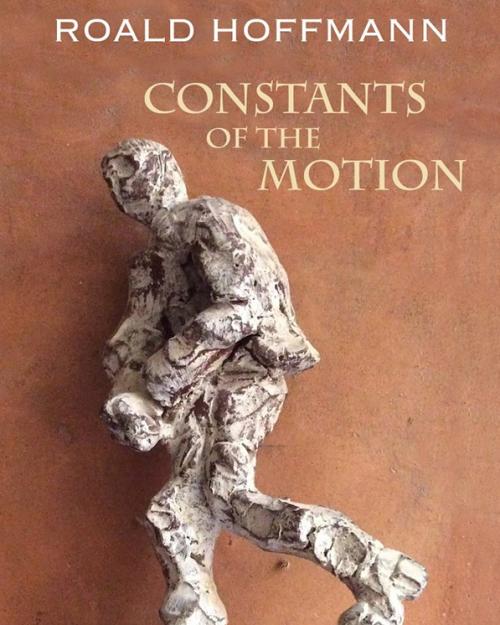Roald Hoffmann received a Nobel Prize in 1981 for chemistry, but he’s been writing poetry since the 1970s and is as likely to be wrestling with lyrical verses as thinking about molecules. His fifth book of poetry, “Constants in Motion,” was recently published by Dos Madres Press.
The poems in Hoffmann’s latest work interweave Hoffmann’s scientific perspective with his poetic sensibility, often in unexpected ways. For example, in “Singing in the Rain, Provence,” (dedicated to Evert Lindfors, the artist who created the sculpture on the book’s cover), Hoffmann describes himself walking in the rain, the closest to dancing he’ll ever come:
Or the rain could
twist, like an in-
tegral sign, or
its drops reach and
seize hold, in lines
at 45 degrees
Hoffmann was invited to write three poems for the journal Nature on the 50th anniversary of the Watson and Crick paper; they never appeared in Nature but are included in the book. One, “Code, Memory,” carries us through evolution with science and wordplay, such as in the lines “The word sings, in alp/and alkaline phosphatase/and DNA, in nuanced refrain.”
Nature is a recurring theme for Hoffmann, with details like an oak’s “jagged gall growth” or “the rusty tangle of uprooted vines.”
Many of the poems in the new collection have been previously published, including “Just When We Are Safest,” in The Yale Review; “With, or Against,” in the Beloit Poetry Journal; “The Exchange,” in Southwest Review; and both “Basket Philosophy” and “Tectonics” in the Alabama Literary Review. A play by Hoffmann about his and his mother’s survival in the Holocaust incorporates some of the poems from the collection as well; that play has also been published by Dos Madres Press.
Although the poems in the collection touch on many aspects of Hoffmann’s interests, he’s wary of being “typed” as a scientist or poet or even Holocaust survivor. “I want to be seen as a person,” he said.
In carving out his own niche between poetry, philosophy and science, Hoffmann has advocated for the importance of interdisciplinary work.
“Science needs the tempering effect of the humanities,” Hoffmann said. In a 2014 interview with the Cosmopolitan Review he also addressed the topic, saying, “We need the arts, for they address the problems that are capable of no solution, only infinite paraphrasing, infinite resolutions.”
Bilingual editions of his poems have been published in Spanish and Russian and he has written five nonfiction books, three plays and published numerous essays on science and philosophy. His poems have been translated into French, German, Portuguese, Russian, Spanish, Catalan, Galician, Polish, Croatian and Swedish. One of his poems appears in “The Best American Poetry 1994,” edited by the late A.R. Ammons, who, along with Phyllis Janowitz and David Burak had considerable influence on his writing, Hoffmann said.
Hoffmann, the Frank H.T. Rhodes Professor of Humane Letters Emeritus in the College of Arts and Sciences, has specialized in theoretical chemistry at Cornell since 1965; his current research interest is materials under high pressure.
Hoffmann will be giving a live, virtual Chats in the Stacks talk about “Constants of the Motion” on Friday April 2 at 4 pm.
Read the story in the Cornell Chronicle.




